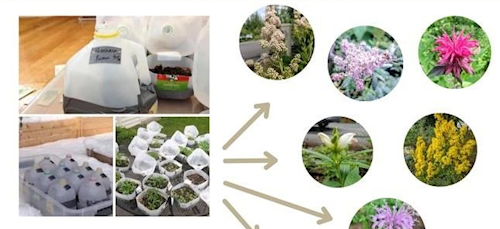Above: If you’d like to have plants in your yard and around the community this summer that support native pollinators, sign up now for the seeds and workshop to get you started. (image from event registration pages)
The Open Space Preservation Commission’s 2025 Winter Sow Program is underway. Register now to pick up free seeds at a drive thru event this Sunday. And if you need instructions (or want to do your sowing in a social setting) you can also sign up for that afternoon’s workshop.
The deadlines for sign up are:
- Friday, January 17th at 5:30 pm for the Seed Pickup
- Saturday, January 18th at 5:30 pm for the workshop
But, the earlier you register, the better chance you have of getting the seeds that you want. Although, there are plenty of options to choose from.
The event promotion describes over 60 varieties of seeds available, including “over a dozen new offerings”.
The list features photos of plants in bloom and details the bloom times (which range from March – October), how much sun/shade plants need, whether soil should be wet or dry, plant heights, and other important information.
As I’ve previously explained, the “Winter Sow” program is part of OSPC’s initiative to support local pollinators (especially endangered ones) by nurturing native plants.
The list is all of seeds for native plants that support native pollinators. Many specifically support support the bumblebee species bombus fervidus and/or bombus vagans. (You can read about the OSPC’s Beecology partnership with a UMass professor to research and support those threatened species here.)
Many of the native plants also attract other native bees, butterflies, hummingbirds, other birds, and/or native caterpillars. (Previously, OSPC Chair Freddie Gillespie highlighted that one of the reasons for the sharp decline in common backyard bird species is the decline in the population of caterpillars they feed on. Many of those caterpillars only/mostly lay eggs on native plants.)
I’m sharing details and background below. But you can read OSPC’s information on their website here.
In promotions for the program in past years, OSPC explained:
Our native plants have co-evolved with New England weather patterns with most native plants requiring a period of repeated freezing and thawing for their seeds to break dormancy and germinate.
Participation means you can set the stage to have beautiful flowers and wonderful plants in your yard this summer while “helping our most at risk pollinators”.
In 2020 Volunteers first got together at public hands-on workshops in Southborough to prepare and sow seeds in the winter and foster them into seedlings ready for planting in the spring. Since then, the program has grown.
Over the years, OSPC has continued to increase the number of native seed varieties they offer.
Participants will be able to pickup their seeds on Sunday, January 19th from 12:00 to 1:00 pm. Volunteers will be handing out the packets at a drive-through pickup behind the Southborough Senior Center/Cordaville , 9 Cordaville Road.
You can find the link for the list of offered plants with pictures and details here. To order free seeds, use the “Reserve a Spot” button on a linked EventBrite page here. (It will pull up a list under Checkout, allowing you to check the boxes for the seeds you want to order.)
To take part in the Hands-On Workshop for sowing the seeds that afternoon at Cordaville Hall from 1:30 – 2:30 pm, click here. (Pre-registration is required.) Organizers will provide seeds, soil and duct tape. But participants will need to bring at least two clean gallon jugs made of clear plastic “and your enthusiasm”.
The workshop focus is on sowing seeds to generate native plant seedlings. Participants will get to bring home their own mini greenhouse in a milk jug. By the spring, those who follow the instructions should have seedlings ready for planting.
The event will be run by OSPC’s Freddie Gillespie. In a past year she explained:
Most native seeds require cold stratification to germinate. That is, they need repeated freeze and thaw conditions after being planted.
The greenhouse jugs are placed outside, allowing the seeds to go through the temperature changes while being protected from birds and squirrels.
Updated (1/16/25 10:29 am): I inserted deadlines for registration that I received.


